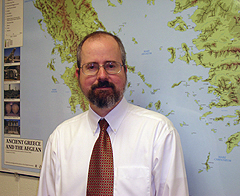When Randall Nichols recently received a major award for his achievements as a high school classics teacher, it brought back fond memories of his former professors at UCSC.
In fact, the Cowell ’80 alum firmly believes that his experience at UCSC significantly changed the course of his life.
“Whenever I am asked why I became a high school classics teacher, I remember three professors from my undergraduate days at the University of California at Santa Cruz: John Lynch, Mary-Kay Gamel and Gary Miles,” Nichols wrote in a recent issue of the classics journal Amphora.
“The excellence of their teaching drew me to classics. They encouraged me along the way and their educational beliefs and practices have influenced mine.”
Nichols is now in his 19th year of teaching Latin and Greek to 8th-12th graders at the Westminster Schools of Augusta, Georgia. He has been named STAR teacher in his county and was awarded a National Endowment for the Humanities fellowship to study Greek and Latin lyric poetry in the summer under classics scholar Gregory Nagy at Harvard. He also serves on the Advisory Committee for the National Latin Exam.
But more important to Nichols are the awards that his students have received. On the 2003 National Latin Exam, 32 percent of them had perfect scores, 80 percent earned gold medals, 18 percent received silver medals, and 100 percent scored above the national average and received awards. His students have won National Greek and Latin Exam scholarships and they regularly place out of the first two years of Latin and Greek in college. Many of them go on to major in classics at prominent universities throughout the country.
“I am equally proud of the fact that I rarely lose a student,” Nichols observed. “One can achieve high scores by ‘weeding out’ some students, or one can achieve low rates of attrition by lowering standards. I believe that the art of teaching rests in maintaining high standards without losing students.”
Nichols noted that the educational atmosphere at UCSC played a major role in his original decision to study at the campus.
“There was an emphasis on undergraduate teaching, which attracted me to it over some other better-known campuses,” Nichols said. “I was taught elementary Greek and Latin by experienced and knowledgeable faculty, not by graduate students or junior faculty.”
Nichols had particular praise for the “effectiveness of John Lynch’s remarkable teaching,” noting that Lynch made learning easier through his high standards, clear expectations, thorough preparation, compassion, and engaging style. “The mention of his name all these years later still evokes strong emotions,” Nichols said.
As he took more courses in the classics at UCSC, Nichols found that other faculty in the department shared Lynch’s gift for teaching. “Professor Mary-Kay Gamel provided me with a model of how to guide and encourage students inexperienced in literary interpretation,” he recalled. After recently coming across the first paper he ever wrote for her classics course, Nichols resolved to “make my future comments on students’ papers as merciful, judicious, and instructive as Professor Gamel’s were on mine.”
Nichols said that he has carried in his memory the images of his former classics professors at UCSC (who are all still at the campus) for more than two decades. In turn, he wonders what kind of images he is forming in the minds of his own students.
“It is humbling to think of the power that we wield, for better or for worse,” Nichols confided at the end of his journal article in Amphora. “I intend to provide my students with challenging and rigorous training, but I hope the image that I fashion will convey the patience, kindness, and respect that I experienced from John Lynch, Mary-Kay Gamel, and Gary Miles. Such images have the power to change a student’s life. They have changed mine.”
Article by Scott Rappaport

